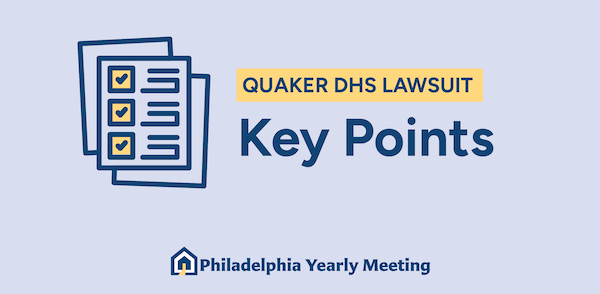
Below is essential information about the lawsuit. This may be helpful to Friends in PYM for their own understanding and for discussing the case with others, including local media.
Please note that in Philadelphia Yearly Meeting, meetings and individuals speak for themselves. However, we have delegated the responsibility to speak on behalf of the whole Yearly Meeting to the Presiding Clerk, Nikki Mosgrove, and the General Secretary, Christie Duncan-Tessmer. Media and other requests can be forwarded to Christie Duncan-Tessmer, General Secretary, at cduncan-tessmer@pym.org or 215-241-7210.
Plaintiffs and Representation in the Suit
This suit is brought jointly by Philadelphia Yearly Meeting (PYM), New England Yearly Meeting (NEYM), and Baltimore Yearly Meeting (BYM), along with two monthly meetings within BYM.
We are represented by Democracy Forward, a nonprofit organization that uses the law to build collective power and advance a bold, vibrant democracy for all people. While they are not Quaker, they have taken the time to learn about our worship, decision-making, and community practices. They have represented our faith well in the suit and are providing their services pro bono.
Purpose of the Suit
We are asking the court to declare unconstitutional any policy permitting government agents to carry out immigration enforcement activities at or near houses of worship.
Background on the Issue
The Trump-Vance administration rescinded a 31-year policy that prevented immigration enforcement—including arrests, investigations, or surveillance—at “protected areas,” also called “sensitive locations,” such as schools, hospitals, houses of worship, and public religious ceremonies like weddings and funerals.
The new policy allows government agents to conduct enforcement operations in these locations, requiring only that they use “common sense.” As a result, people of various faiths may avoid attending their houses of worship out of fear of government enforcement. This harms immigrants who feel compelled to stay home and also damages houses of worship and their members, who lose the ability to gather in worship as a community.
Why Quakers and PYM Are Bringing This Suit Forward
Our lawyers have succinctly summed it up:
“…the right to associate for religious exercise, including communal religious worship, is well established. DHS’s new policy violates that right by deterring worshippers from attending services or otherwise joining their religious communities. That harms not only those who are too fearful to attend services, but also their fellow congregants and houses of worship themselves. This is especially true for Quakers, who deeply believe that every person, no matter their background, can receive and deliver messages from God. Put simply, deterring attendance at Quaker worship impedes our clients’ ability to experience the divine.”
Philadelphia Yearly Meeting Has Two Primary Reasons for Participating In the Suit:
1.The new policy interferes with our ability to practice our faith.
Our faith teaches that anyone and everyone with a leading toward the Quaker path is welcome—and indeed necessary—to participate in worship. We draw closer to the kin-dom of God when we experience Truth as it is revealed through others. A diversity of voices is essential to our spiritual experience.
When the government makes decisions that reduce access to worship and other religious practices, it interferes with our right to assemble and participate in our faith.
Additionally, for hundreds of years, Quakers have been committed to peace. Knowingly putting a person in harm’s way or subjecting them to the possibility of a violent encounter with an armed law enforcement officer would violate our deeply held beliefs in peace and nonviolence.
2. The new policy interferes with other faiths’ ability to practice.
Freedom of religion in this region was championed by Quakers, and we continue to uphold its importance. Philadelphia Yearly Meeting was established in 1682—the same year William Penn arrived on this continent. Penn explicitly modeled governance here on Quaker principles, calling it the Holy Experiment.
The Charter of Privileges, which established the framework for Pennsylvania’s government, provided for religious freedom so that Quakers and others would be protected from persecution for their faith. The freedom of religion enshrined in the United States Constitution traces its origins back to this Charter of Privileges.
More Information
For more information or additional questions, please contact Nikki Mosgrove, Presiding Clerk of PYM, at nmosgrove@pym.org, or Christie Duncan-Tessmer, General Secretary of PYM, at cduncan-tessmer@pym.org.